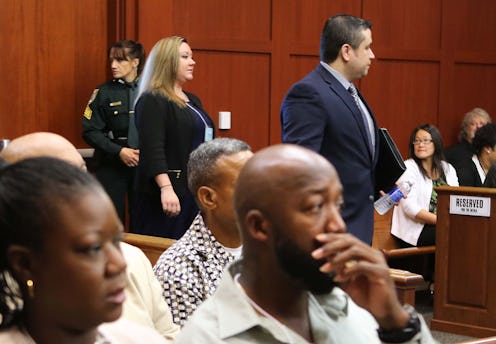News
The End Of The Zimmerman's Trial: Will He Walk Free?
It's been 18 months since Trayvon Martin was shot and killed. As we reach the end of a trial that's polarized the nation, we're still no closer to knowing exactly what happened on the evening of Feb. 26, 2012. We probably never will.
Martin is dead, and millions don't believe Zimmerman's account of the shooting. As closing arguments commence today, analysts and media outlets are suggesting that Zimmerman could well be acquitted of second-degree murder—maybe even as early as Monday. He might also find himself behind bars for the rest of his life. The judge has ruled that the jury could also charge him with a different crime altogether: manslaughter.
It's been one of the most complex cases in recent history, but we've got you covered on its possible outcomes:
1. Zimmerman could walk out of the courthouse a free man.
Law School 101: if someone's up for a specific charge (in this case, murder,) declaring them not guilty does not mean they're saying he didn't kill Martin. If the jury doesn't completely and conclusively believe that Zimmerman murdered Martin with "ill will, hatred, spite or evil intent"—that's straight from the legal dictionary—then they've sworn to declare him not guilty. Zimmerman will then walk straight out.
Predictions are flying around that this could well be the case. The crux of the outcome, analysts say, is that the prosecution team has been unable to provide a feasible alternative to Zimmerman's narrative. Their purported scenario—that Zimmerman was racist and bully who cornered and shot Martin because he profiled the teenager as a criminal—has been undermined by both witnesses and experts. You'd have to believe a strong percentage of witnesses were lying under oath, or at least flat-out wrong in their expert opinion, to go for the "guilty" option.
The case's lead investigator has stated he believes Zimmerman's account of events, and some experts have maintained that his narrative is credible (according to evidence). It also hasn't helped the prosecution's case that their lead investigator was indicted for allegedly "rushing" the Zimmerman charges in light of the media furore.
In the event of his walking, Floridian police are already preparing for riots.
2. Zimmerman could be be found guilty.
Whatever the outcome, it's impossible to ignore the racial tensions at the heart of this case. Even if there was no "racial profiling" involved in the actual event, (a phrase which judge Debra S. Nelson has banned from the courtroom), the strongest element at the core of this trial is its racial symbolism. It's already been compared to the tragic case of Emmett Till and other landmark civil-rights events.
Though the jurors were selected because of their "impartiality" to the case, a media event second only to the 2012 presidential election is damn near impossible to ignore. The pressure to convict Zimmerman is tremendous. (It's been pointed out several times that if Zimmerman had been black and Martin white, it's hard to imagine Zimmerman being released after five hours of questioning.) Even if the issue had no bearing on what happened on Feb. 26, 2012, it will likely have an effect on the verdict.
There's also a decent amount of evidence indicating Zimmerman's guilt: his overzealous behavior towards keeping his community secure; the alleged bullying and racial profiling he'd embarked on in the past; the witnesses who claim they saw Zimmerman on top of Martin; and the friends and family who have claimed they heard Martin shout "help" in the recorded 911 call. Trayvon's body was also found in a different position than the one Zimmerman claimed. "His body speaks to you," said prosecutor Bernie de la Rionda in closing arguments. "It proves to you that the defendant is lying about what happened."
3. Something else entirely might happen...we just don't know what.
As with all hearings, there are other options that, if not likely, are legally possible. Zimmerman's charges could be reduced, or the case could be dismissed altogether. The judge may rule for a retrial, and has already given the jury the option to consider the lesser charge of manslaughter. Either way, both Zimmerman and the State could appeal. Even later, if it's proven that the jury was biased in some way, the entire trial could have a second round.
For now, we'll just have to wait and see.
